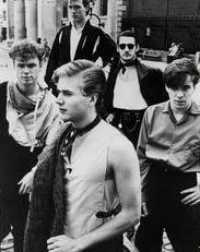Originally they weren't Spandau Ballet at all, they weren't a band, but a gang of immaculate ne'er-do-wells, dubbed the Angel Boys, lary lads out of the Angel Islington, who gravitated to the grooviest haunts in Soho and Covent Garden. And at the core of this coterie were the brothers Kemp, a pair of undeniably good looking boys who'd done a bit of acting and still knew how to look the part and cast theatrical shapes on a dance floor. But no one knew that they harboured musical ambitions. Not that is until fellow north Londoner Steve Dagger announced that they had a band and he was their manager.
He used it to invite a dozen or so of the elaborately attired young movers and shakers from the highly trendy club scene, to a rehearsal in a dodgy Islington studio. Gary had written a handful of brilliant songs, which combined their life-long love of black American dance music with the angular elan of Bowie and Roxy and the currently cool sound of Electro-Euro-disco.
A name was now needed. Berlin was then the cool city where Bowie and Iggy hung out, and its infamous castle prison seemed like a good venue for a decadent dance. Hence Spandau Ballet, a name guaranteed to grab a few headlines and imply a certain arty arrogance.
The newly born Face magazine put the Ballet boys on the cover, television companies queued up to film them and their amazing assemblage of fans, and of course record companies begged to be allowed in to see this new phenomena at their infamously elitist gigs.
When they finally signed a major record deal they had a handful of brilliantly catchy pop/dance tunes which would instantly propel them out of their trendy confines. Yet despite having major hits like 'To Cut A Long Story Short' and 'Musclebound', they were still very much an integral part of the ultra-credible club culture.
By the time they released 'Chant No.1', with its driving funk rhythms, blazing horn section, Soho rap and its trippy, truly trendy video set in the Beat Route, the steamiest club in any town, they were at the very top of the club game.
In 1983 the refined blue-eyed soul sound of the 'True' album recorded in super cool Compass Point Studios in Nassau produced by Steve Jolley and Tony Swain took the group out of the clubs to a huge worldwide audience. This brilliant set of Gary Kemp songs spawned some classic singles, 'True', 'Gold', 'Lifeline' and 'Communication', which were to dominate the airwaves and the charts of the whole world that year.
Now the groups record sales counted in their millions rather that their hundreds of thousands and from here on in Spandau Ballet were about to become a huge world-wide success, moving from warehouse parties to stadium gigs, from Angel Boys to rock Gods.
After a few years at the very top, I guess the desire just dipped a little. They'd accomplished just about everything a bunch of schoolmates ever wanted, they'd become one of the biggest bands in the world and a whole new generation of London boys and girls were forging new club scenes and club sounds of their own.
Source: http://www.spandaugold.com/
